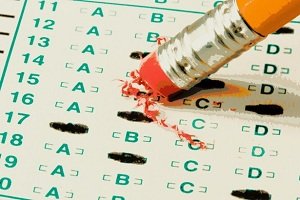 We are all used to the notion of students cheating to get better results – it is not something to be proud of, it is not considered a good thing, but it is normal. We try to prevent them from doing it – either by looking over them or by encouraging honesty, but when they cheat, we are not surprised.
We are all used to the notion of students cheating to get better results – it is not something to be proud of, it is not considered a good thing, but it is normal. We try to prevent them from doing it – either by looking over them or by encouraging honesty, but when they cheat, we are not surprised.
However, teachers’ cheating is still a rather outlandish notion, causing a bit of cognitive dissonance in some people. Yet when you think about it, it is rather hard to understand why.
Cheating is an inherently human behavior – an inherent economical behavior, so to say, aimed at getting more in exchange for less. Whenever there is a system, there will be people trying to play it, and it doesn’t matter what their positions in life are – they are still people.
It is no use to appeal to people’s conscience or try and control their every move – if there are any benefits to be received by cheating, there will always be somebody who will consider risk to be small enough to try it out. There is no way to eliminate cheating, either – one can only minimize it by creating a system that makes it mostly not worth the risks.
However, current educational systems in many developed countries look almost as if they have been created in order to propagate as much cheating among teachers as possible. Teachers are considered to be directly responsible for their students’ successes and failures, schools have to meet certain requirements in terms of students’ levels of knowledge and test results, their financing depends on how many students successfully pass exams and so on – is it all that surprising that many teachers and the entire school will try to improve their results artificially?
Sometimes cheating is done crudely and amateurishly. One teacher in the United States was reported by her own pupils to simply write the answers to their test on the whiteboard. Another gave her students top scores on a mandatory citywide exam without actually bothering to administer the test. One feels appalled not so much by the moral deficiencies of these people, but by the fact that somebody that feather-brained was given a job to teach children.
Other teachers are much more ingenuous: they change several answers in the tests written by weaker students, or give them additional time to complete the test, or coach them using tests from previous years, but this cheating can be revealed using correct techniques, nonetheless. And recent investigations show that cheating, both blatant and careful, is rampant in American educational institutions, carried out by individual teachers and entire schools when they feel pressed to delivering better results or simply try to improve their standing.
Again, it is useless to condemn them. One may try to fight cheating among teachers – there are, for example, algorithms for checking test results that allow one to reveal cheating with a very high degree of certainty. But the only way to effectively decrease its levels would be changes in educational system that will make cheating economically unviable.
